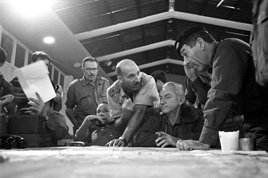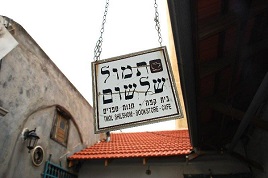The Yom Kippur War broke out on October 6, 1973 – a surprise attack on Israel by the Syrian and Egyptian armies. The Israel Defense Forces were taken by surprise, as were Israel’s intelligence and political echelons, and the general public, many of whom were called up for reserve duty with only hours to spare.
Unlike the 1967 war, this time around the Arab countries were equipped with new tactics and weapons technologies reflecting a new strategic approach in their conflict with Israel. Despite the harsh surprise, Israel was able to repel the attack and preserve the territorial gains made in the Six Day War. But the losses were great: casualties were high at almost 3,000 soldiers dead, and public morale was damaged badly; Israelis were gravely disappointed in the failures of intelligence and the government.
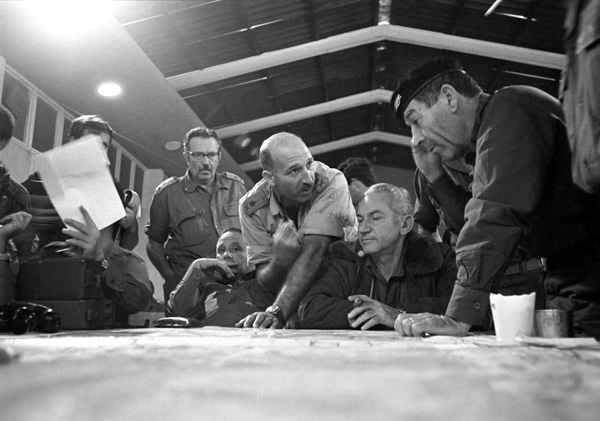 Image: Agranat commission of inquiry. Source: IDF Archive.
Image: Agranat commission of inquiry. Source: IDF Archive.
40 years later, Israel is still feeling the impact of the ’73 war; it had such a profound effect on Israeli society. Things now taken for granted here, such as public protest and media criticism against government and military policies, were rare to non-existent prior to the Yom Kippur War. Post-traumatic stress disorder was not recognized or acknowledged.
Over the years, all have come to agree that the trauma on a societal and individual level were not dealt with properly. Sometimes, corrective measures are taken.
So, for example, it is very interesting to note that the 40th anniversary of the Yom Kippur War is being handled in a non-bombastic, reflective manner. Israel Defense magazine organized a conference geared toward persons in the military and in the defense industries (taking place tomorrow, September 9 at Latrun) that will analyze the effects of the war on the design of the modern-day battlefield with talks ranging from how to implement and act on the lessons learned, to intelligence challenges and threats, breakthrough technologies, and on through leadership and values of the IDF, then and now.
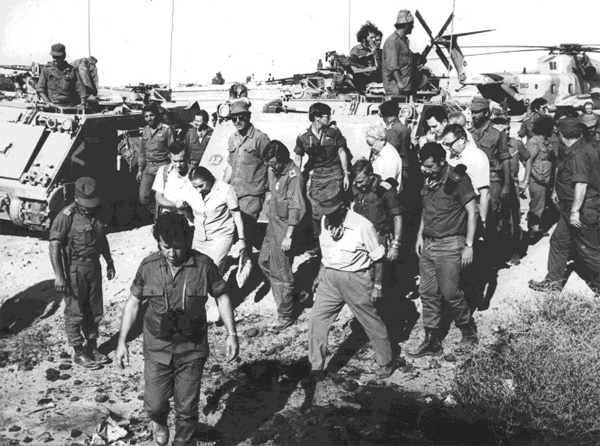 Image: Prime Minister Golda Meir tours the Southern Command. Source: IDF Archive.
Image: Prime Minister Golda Meir tours the Southern Command. Source: IDF Archive.
Galei Zahal (GLZ) the Army Radio, this summer issued a call for soldiers who fought in Yom Kippur War interested in locating someone they’d known or met during the war and with whom they’d subsequently lost contact. The result is a fascinating series called 40 After the War (in Hebrew only).
Another GLZ special series(Hebrew only), Clouds of War, will present new programming, rebroadcasts of historical recordings and special performances.
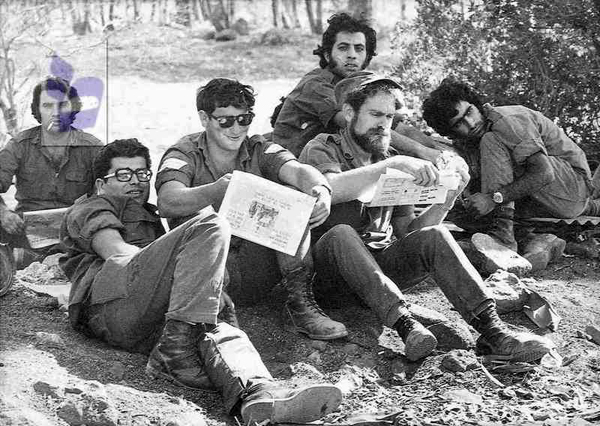 Image courtesy of Yad Tabenkin.
Image courtesy of Yad Tabenkin.
Gen. ( res.) Ephraim Lapid, former IDF spokesman , Army Radio commander and a senior intelligence officer, reports in Megafon News, an independent online Hebrew-language news source, that two new studies about the October War are slated to be issued this year. The first, a comprehensive study of the War by IDF Department of History researcher, the late Dr. Elhanan Oren, was actually completed 20 years ago “but release was delayed for various reasons until this year”.
The second study by Dr. Shimon Golan, another senior researcher of military history, is a preliminary comprehensive study about the conduct of senior level officers during the war.
Both studies are unique in that the research was based on primary sources: protocols , transcript of discussion, recordings of communications, operational orders and personal interviews with senior commanders; many of these sources were not accessible to any previous publication about the war.
In addition, the Israel National Defense College will host a major conference, also on lessons learned from the war. Lapid notes that the overwhelming majority of conference attendees were not yet born in 1973.
There will, of course, be individual events organized by army units, families and veterans’ associations. More significantly, on Memorial Day this coming year, the IDF will place a special emphasis on the fallen of the Yom Kippur War.
Images courtesy of the IDEA kibbutz movement online archives: Yad Yaari / Moreshet (Givat Chaviva) and Yad Tabenkin (Efal) and IDF / Ministry of Defense archives.




